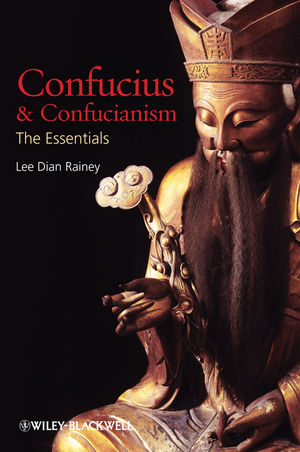Confucius and Confucianism: The EssentialsISBN: 978-1-4051-8841-8
Hardcover
278 pages
May 2010, Wiley-Blackwell
 This is a Print-on-Demand title. It will be printed specifically to fill your order. Please allow an additional 10-15 days delivery time. The book is not returnable.
Other Available Formats: Paperback
|
||||||
Preface: Why Confucius?
Book Notes.
Chronology.
1 Confucius’ World and His Life.
Confucius’ World: Looking Back to a Long, Unifi ed Civilization.
The Zhou Dynasty.
Ancestors and Spirits.
Heaven and the “Choice of Heaven”.
The Decline of the Zhou Dynasty and the Rise of the Warring States.
The Life of Confucius.
Sources.
Versions of the Texts.
Hagiography, the Pious Stories of Confucius’ Life.
Scholarly Versions of Confucius’ Life.
2 Confucius’ Teachings I: The Foundation of a Good Person.
Filial Piety.
Dutifulness or Loyalty.
Honesty and Sincerity.
Rightness and Knowledge.
Courage.
Understanding, Sympathy, Compassion.
Humanity.
Ritual.
The Gentleman.
3 Confucius’ Teachings II: The Foundation of a Good Society and Other Topics.
Setting Words Right.
For the Benefi t of the People.
Laws.
Models.
Education without Distinction.
Women.
The Gods, the Spirits of the Dead, and the Afterlife.
The Choice of Heaven and Heaven.
Fate.
The Way.
4 Terms, and Mozi.
Problems with “Schools” and “-isms”.
Problems with the Term “Confucianism”.
Mozi and Mohism.
5 Opponents.
Daoism.
The Strategists.
The Logicians.
Legalism.
Others.
6 Mencius.
Human Nature is Good.
Human Nature and Heaven.
Government.
Mencius on Confucian Themes.
Summary.
7 Xunzi.
Human Nature is Evil.
Morality is Artifi cial.
Ritual.
Government.
Language.
Heaven.
Xunzi on Confucian Themes.
Summary.
8 Confucians, “Confucian” Texts, and the Qin Dynasty.
Other Confucian Groups.
Confucius and “Confucian” Texts.
The First Emperor and the Reunifi cation of China.
9 The Han Dynasty, 206 BCE–220 CE.
History and Development.
The Classics in the Han.
The New Text School.
The Yin-Yang Theory.
Qi.
The Five Phases.
The Status of Confucius.
The Old Text School.
Other Confucian Texts in the Han Dynasty.
Summary.
10 From the Han to the Tang Dynasties, 220–907 CE.
Buddhism and Its Development.
Confucianism from the Han to the Tang Dynasties.
Civil Service Examinations and the Imperial Civil Service.
The Civil Service.
The Status of Confucius in Imperial China.
Confucian Temples.
Confucius as a God.
Confucianism outside of China: Korea, Japan, and Vietnam.
Summary.
11 Neo-Confucianism.
The Northern and Southern Song Dynasties.
Neo-Confucianism.
Issues in Neo-Confucianism.
Early Neo-Confucian Thinkers.
Zhu Xi (1130–1200) and Li Xue, the School of Principle.
The School of Mind/Heart.
Wang Yangming.
Summary.
12 Confucianism and Modernity.
The Qing Dynasty, 1644–1911.
Kang Youwei (1858–1927) and the Reform of Confucianism.
The May 4th Movement.
The Guomindang and the New Life Movement.
The Communist Party and the Communist Government.
New Confucians.
Confucianism as the Foundation of Chinese Culture.
Substance/Application.
The Confucian Core.
Confucianism as Religion.
Asian Values.
Governments: Taiwan, Singapore, and China.
Critics of New Confucianism.
New Confucianism’s Impact and Importance.
Summary.
13 Issues.
What is Confucianism?
Democracy.
The Emphasis on the Economy.
Ritual.
Filial Piety.
Education.
Self-cultivation.
Does Confucianism Include Women? Can Confucianism Include Women?
Critics.
Is Confucianism a Religion? A Philosophy? Something Else?
Summary.
Notes.
Glossary of Names and Terms.
Suggestions for Further Reading.
Bibliography.
Index.



